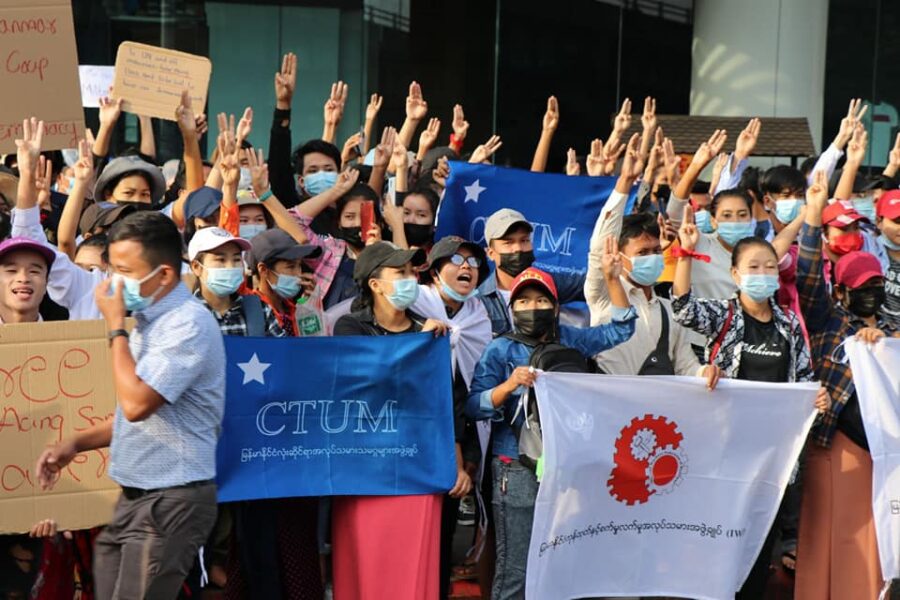
Dec 7, 2021
Democracy enables workers and their unions to flourish, and as it is increasingly threatened around the world, democracy also depends on working people and their organizations to keep it vibrant, according to speakers at the high-level event, “Worker Organizations’ Vital Role in Democracy.” (Watch for the full recorded session here.)

“We stand with all workers everywhere who are on the front lines of democracy”—AFL-CIO President Liz Shuler. Credit: Solidarity Center
“Threats to democracy go hand-in-hand with threats to workers’ right to form unions,” said AFL-CIO President Liz Shuler, speaking at the November 7 virtual forum. “We stand with all workers everywhere who are on the front lines of democracy in their countries and their workplaces.”
The forum, an official side event of the December 9-10 U.S. Summit for Democracy, brought together union leaders, labor ministers and philanthropic organizations from around the world to highlight the role of worker voice and worker rights as fundamental components of democracy and spur global action in support of freedom of association and collective bargaining.
“Worker Organizations’ Vital Role in Democracy” built on recommendations that emerged from four listening sessions with 250 U.S. government officials and labor leaders from Asia, Africa, the Americas, Europe and the Middle East and North Africa. The Solidarity Center, International Trade Union Organization (ITUC) and the AFL-CIO assisted in organizing the sessions.
“The freedom to form unions is a human right,” said U.S. Labor Secretary Marty Walsh, opening the event. “For global democracy to thrive, the global community must support workers right to independent organizing and bargaining.” In announcing the launch of the Multilateral Partnership for Organizing, Worker Empowerment and Rights (M-POWER) initiative, a year-long efforts by governments, unions and the private sector, Walsh said its goals include extending labor law coverage and strengthening unions.
“When we say workers need a seat at the table, we mean it.”
Democracy Under Threat: The Voice of Workers
During a session exploring worker rights, ITUC General Secretary Sharan Burrow highlighted how economic inequalities—such as the 60 percent of the world’s workers who survive through informal jobs with no rights and no protections—threaten democracy. The ITUC and global labor movement are championing a new social contract, one that includes “Jobs, jobs, jobs, jobs,” said Burrow.
It’s time to return to full employment” with rights and protections for all workers, she said, with a new social contract that includes equality and inclusion for all workers, a push reiterated by International Labor Organization Director General Guy Ryder.
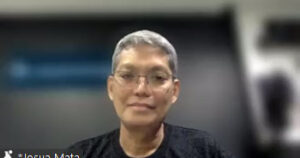
Josua Mata at SENTRO says union members are standing up to brutal assaults on democracy and freedom of association. Credit: Solidarity Center
From the Philippines, Josua Mata, general secretary of the United and Progressive Workers Center (SENTRO), described a bleak environment for workers and their unions, with more than 50 union members killed since 2016 and ongoing redtagging (branding and accusing individuals and/or organizations of being terrorists), illegal firing of union activists and anti-terrorism laws directed at stifling freedom to form unions and bargain.
“Any claim that there is freedom of association in Philippines is a lie,” said Mata. Despite the dangers, he and other union activist there are determined to persist in the struggle for democracy.
“All of this has not stopped us from continuing to do what needs to be done.”
A union leader from Brazil shared her struggle with state corruption. Yet, like Mata, Carmen Foro, general secretary of the Central Union of Workers (CUT) vowed to continue the fight for transparent and free government to enable workers to freely exercise their rights.
“Unions are indispensable to democracy,” said Foro.
In a rallying cry to workers in the United States and around the world, Randi Weingarten, president of the U.S.-based American Federation of Teachers (AFT) said workers must see the struggle to engender and preserve democracy “the same as we would fight for a collective bargaining contract. The fight for democracy is the same as the fight for wages, the fight for dignity.”
Said Solidarity Center Executive Director Shawna Bader-Blau: “No social or political progress happens by magic. Change is pushed by people working collectively. And legitimacy of the government comes from the people.”
Launching a Global Year of Action
Partners in the M-POWER initiative will come together in a year to evaluate progress and recommit to improving worker rights worldwide. Announcing a $100 million pledge by philanthropic organizations through Funders Organized for Rights in the Global Economy (FORGE), Open Society Foundation Executive Director Thomas Periello said the commitment is an important statement for philanthropy to do its part keep worker rights and justice central to its work around the world.”
“As we see rise of threat of authoritarianism around the world, democracies need to deliver, and a huge part of that is free unions,” he said.
Government officials from the U.S. Agency for International Development (USAID), the State Department and Labor Department’s Bureau of International Labor Affairs (ILAB) shared their support of M-POWER’s goals and highlighted the U.S. government’s significant financial commitment to program.
“Governments have a foundational role in providing an enabling role for enabling free and independent unions to thrive,” said Thea Lee, ILAB deputy undersecretary.
Labor ministers from Argentina, Germany, Mexico and Norway also shared how partnerships among union, government and private sector in their countries are enabling workers to reskill and upskill, transfer to jobs in renewable energy and ensure worker rights throughout. “To protect the rights of workers, the first thing we need is a development model to have rights at center,” said Argentina’s Minister of Labor, Employment and Social Security Claudio Moroni.
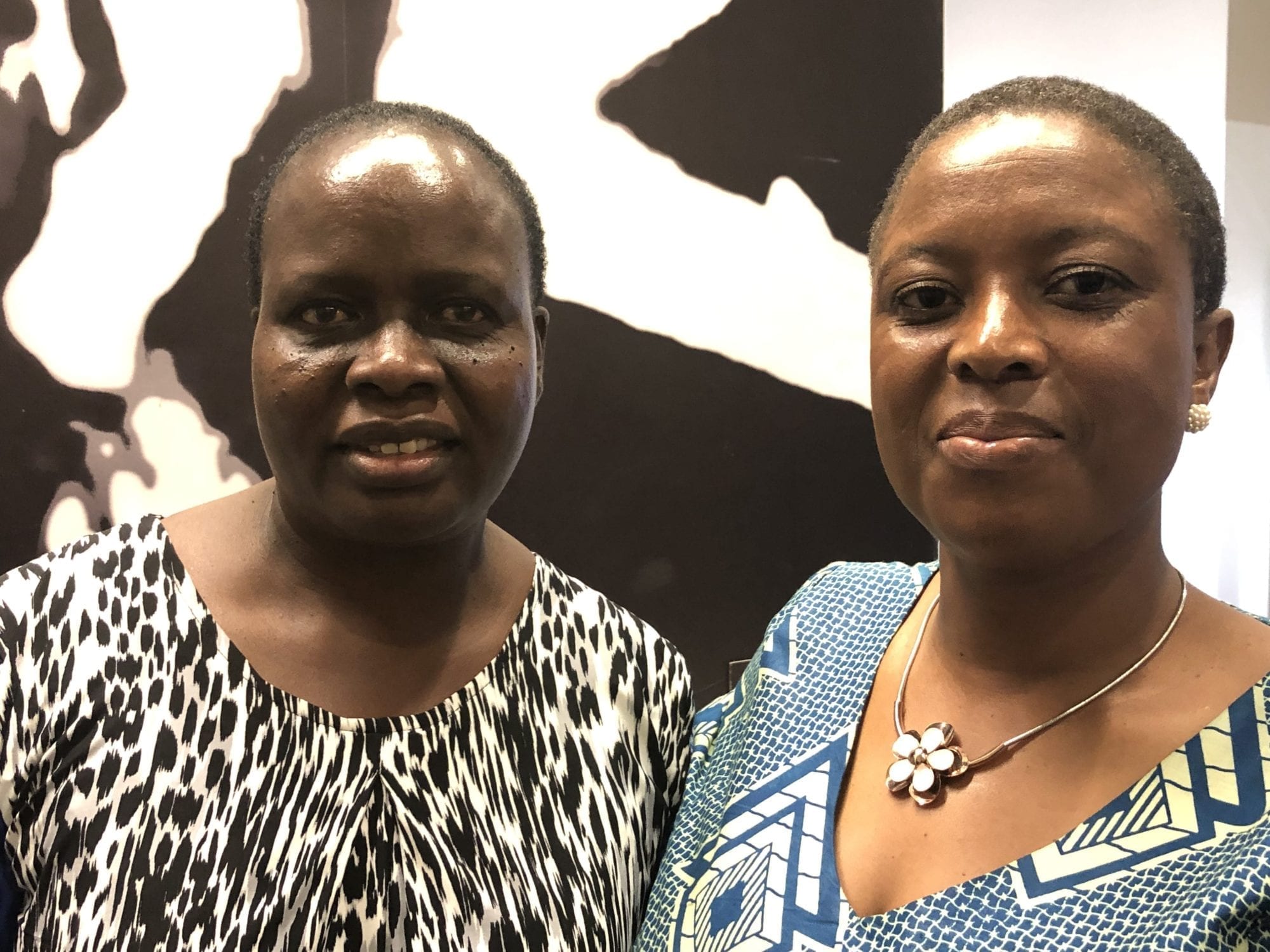
Sep 25, 2019
Dynamic women worker rights leaders from across the globe offered a vision for hope, resilience and movement toward an economy and society that works for people and the planet yesterday at the event, “Building Power: Women’s Leadership in the Fight for Justice, Democracy and Fair Work” in New York City.
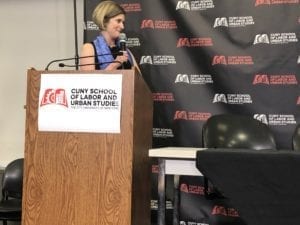
“Collective power is the way to build justice.”—AFL-CIO International Director Cathy Feingold. Credit: Solidarity Center/Tula Connell
“We are bringing women labor leaders together today who are at the forefront of movement building. They all know one thing—collective power is the way to build justice. Collective power is the way to democracy,” said AFL-CIO International Director Cathy Feingold, opening the gathering, a side event to the United Nations General Assembly meetings happening this month. (Watch the event here.)
Sponsored by the Open Society Foundations (OSF), Ford Foundation, Freedom Fund, Fundación Avina, C&A Foundation, Humanity United and AFL-CIO, Solidarity Center and Global Labor Justice, the gathering of representatives from the philanthropic community and worker justice organizations served to both celebrate the achievements of women leaders and reflect on what has worked—and what needs more support—in the fight for justice, democracy and fair work for all.
In a statement issued before the event, the philanthropies committed to supporting labor organizations and worker groups in their portfolios, backing ratification and implementation of International Labor Organization (ILO) Convention 190 to eliminate gender-based violence and harassment at work, and boost advocacy to support civic space.
The philanthropies were inspired by the women who fought for passage of Convention 190, said Laine Romero-Alston, team manager for the Fair Work Program/International Migration Initiative at OSF. “Out of that inspiration we are committing to you all to support the work moving forward.”
‘Dignity and Rights of Working People, Not Exploitation’
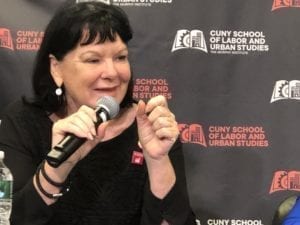
The future of work must be about “dignity and the rights of working people and not exploitation”—ITUC General Secretary Sharan Burrow. Credit: Solidarity Center/Tula Connell
Discussing a global movement for economic justice, democracy and fair work, women union leaders featured on the first of two panels agreed there is a worldwide jobs crisis—and women endure the lowest pay and worst working conditions.
“Look at the inequalities in workplaces, who is most affected? Women are most affected,” said Rose Omamo, general secretary of Amalgamated Union of Kenya Metal Workers and the national chair of the Central Organization of Trade Unions-Kenya (COTU-K) Women’s Committee.
“We need to work in solidarity together, have alliances, build alliances,” said Omamo who, as an elected member of the Organization of African Trade Union Unity and a member of ITUC–Africa Women’s Committee, is building cross-continent partnerships.
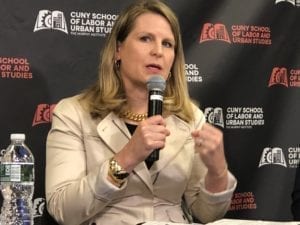
AFL-CIO Secretary-Treasurer Liz Shuler urges unions to reach out to young workers. Credit: Solidarity Center/Tula Connell
“Sixty percent of the world’s workers are in the informal economy with no minimum wage, no rule of law, no social protections,” International Trade Union Confederation (ITUC) General Secretary Sharan Burrow said to the packed crowd. “The employment model is broken down and the future of work must be about dignity and the rights of working people, not exploitation,” she said.
Moderated by Patrick Gaspard, OSF president and former U.S. ambassador to South Africa, the panel also explored solutions for ensuring a future of work rooted in a global economy that works for everyone.
One solution starts with unions themselves: “We need to get more women into union leadership,” said AFL-CIO Secretary-Treasurer Liz Shuler. “We cannot be afraid to fail and experiment and connect with young people by making the labor movement relevant to what they see in their lives.”
‘Elimination of Gender-Based Violence Key to Accessing Other Rights’
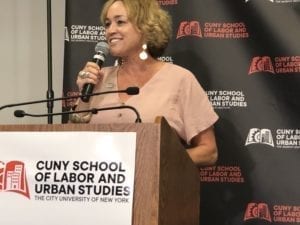
Solidarity Center Executive Director Shawna Bader-Blau: “Labor rights are core to all our democratic rights.” Credit: Solidarity Center/Tula Connell
Moderated by Solidarity Center Shawna Bader-Blau, the second panel included Libakiso Matlho, national director at Women and Law in Southern Africa Research and Education Trust–Lesotho (WLSA). Matlho discussed the recent landmark agreement agreement WLSA participated in negotiating that will address the rampant gender-based violence and harassment denying thousands of women garment workers a safe and dignified workplace in Lesotho.
Lesotho-based unions and women’s rights groups, major fashion brands and international worker rights organizations, including the Solidarity Center, negotiated the worker-centered program in August with factory owner Nien Hsing Textiles.
One element that sets the agreement apart from most corporate social responsibility (CSR) initiatives, she said, is the inclusion of freedom of association. With unions at the table, she said, employers can be held accountable to keeping their commitments.
Worker rights leaders Maricarmen Molina and Anannya Bhattacharjee discussed the structural underpinnings of gender-based violence at work and the ramifications for women workers who suffer such abuse.
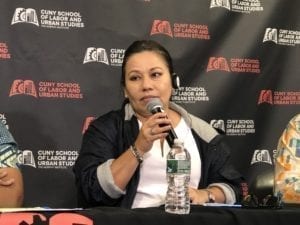
“Violence and harassment are part of a continuum of behaviors in many of the systems where we work”—Mariecaremen Molina Credit: Solidarity Center/Tula Connell
“Violence and harassment are part of a continuum of behaviors in many of the systems where we work,” said Molina, the first woman secretary general of a national union confederation in Central America, the CSTS (Confederación Sindical de Trabajadores y Trabajadoras de El Salvador). The CSTS, working with the national federations CONFUERSA and FEASIES, recently won significant minimum wage increases for workers in service, industrial and agricultural sectors.
“We have found that gender-based violence at the workplace is the most corrosive element that works against everything,” said Bhattacharjee, international coordinator for the Asia Floor Wage Alliance.
“It is really difficult for women in those situations to attempt to form unions,” which would enable them to join together to improve their working conditions.
With Global Labor Justice, Asia Floor Wage Alliance this year launched a global campaign, #GarmentMeToo, a movement led by women union leaders to contribute to new international labor standards.
Elimination of gender-based violence is the necessary condition for accessing other labor rights, such as the right to a living wage, such as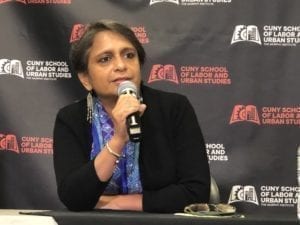 the right to freedom of association,” said Bhattacharjee. “It is part of a global supply chain where the brands are the main drivers. Their purchasing practices are what causes the gender-based violence. Anything we do, they have to build held accountable in any agreement that works.”
the right to freedom of association,” said Bhattacharjee. “It is part of a global supply chain where the brands are the main drivers. Their purchasing practices are what causes the gender-based violence. Anything we do, they have to build held accountable in any agreement that works.”
Unions and collective action are key to holding employers accountable and to ensuring workers can exercise their fundamental rights on the job, the panelists agreed. And “labor rights are core to democracies, they are core to making all our other democratic rights real,” said Bader-Blau, closing the event. “These rights are under attack in every single one of our countries right now. And it is on all of us to stand up for worker rights.
“For every woman trade unionist who has ever received a death threat for daring to lead… for every new activist young and old entering the labor movement right now who doesn’t know if she has a place because our institutions have for so long been so male dominated, we see you,” she said.
“We respect and honor what you are trying to do to make our democracies stronger and more just. You are the future and we all of us in this room have your back because this is what democracy looks like!”
The CUNY School of Labor and Urban Studies hosted the event, with Dean Gregory Mantsios welcoming the group.
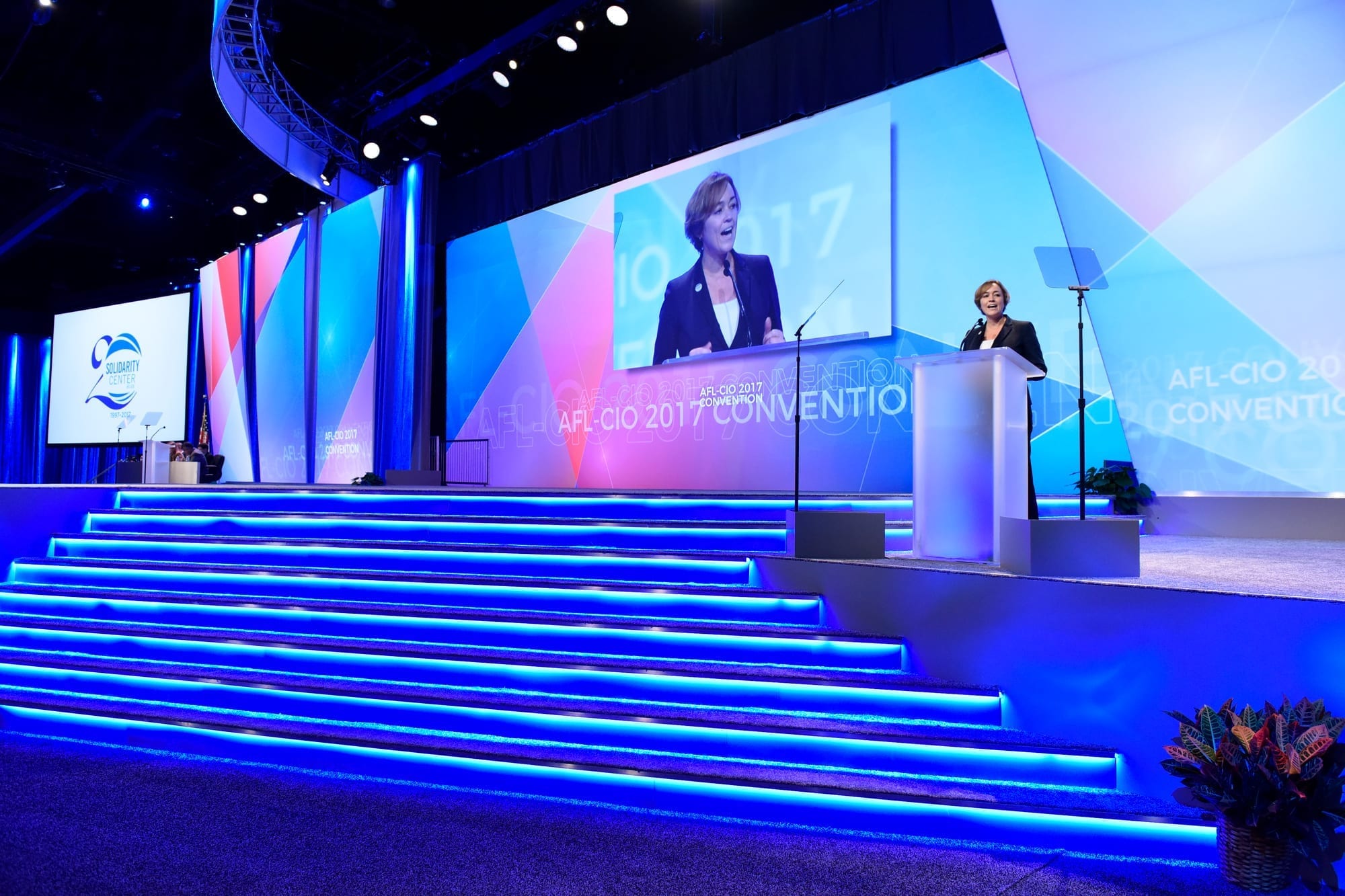
Oct 25, 2017
Delegates to the 2017 AFL-CIO Convention today unanimously passed a resolution supporting the Solidarity Center’s 20th Anniversary.

Solidarity Center Executive Director Shawna Bader-Blau says the Solidarity Center will “double down” in its next 20 years on advancing an agenda of inclusion for the global labor movement in asserting the right to form unions. Credit: Kaveh Sadari
“The Solidarity Center is at the forefront of global movements to protect freedom of association and hold corporations accountable,” according to the resolution. “As the Solidarity Center begins its next 20 years, it commits its future to a global labor movement based on true equality and inclusion for all workers.”
Speaking to convention delegates, Solidarity Center Executive Director Shawna Bader-Blau outlined rising global income inequality, gender pay imbalance and attacks on worker and union rights, but said that “workers everywhere win when we have a deliberate agenda of inclusion for our labor movement, and when we fight for our right to form unions.
“And the Solidarity Center—with you, and with the dozens of unions and millions of workers we can ALL call allies—will double down on that over the next 20 years to make sure it happens.”

CBTU President Terry Melvin was among convention delegates speakng in support of the AFL-CIO resolution on the Solidarity Center’s 20th anniversary. Credit: Solidarity Center/Tula Connell
Bricklayers President Jim Boland introduced the resolution, and representatives of several U.S. unions and affiliated organizations stood to speak in support of Resolution 26: “The Solidarity Center—Twenty Years of Standing up for Workers around the World,” including Coalition of Black Trade Unions (CBTU) President Terry Melvin and IFPTE President Gregg Junemann.
The Solidarity Center is holding its 20th Anniversary celebration dinner November 15 in Washington, D.C. Sponsorship opportunities are available, and there is still time to buy individual tickets.
In conjunction with the celebration, the Solidarity Center also is hosting a book launch discussion on the new publication, Informal Workers and Collective Action. Click here to RSVP.
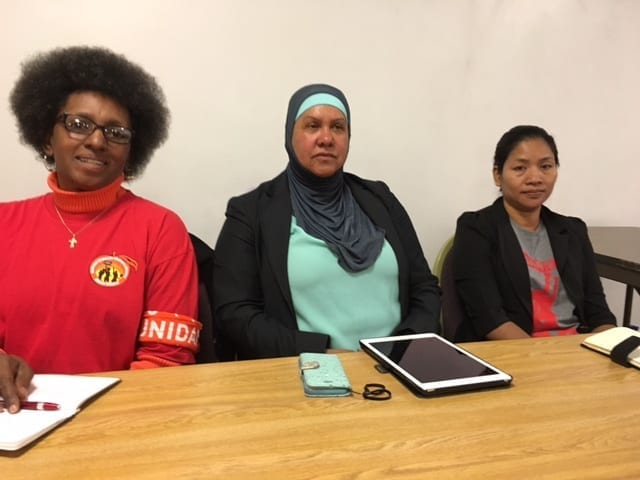
Mar 15, 2017
Women’s economic empowerment is linked to achieving broader labor rights for workers around the globe and women must join together no matter what their interests or jobs to bring about gender equality at work, panelists said today at an AFL-CIO panel in New York City.
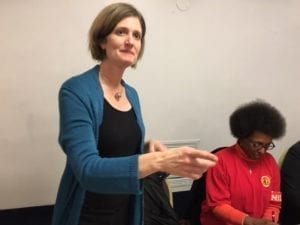
AFL-CIO International Affairs Director Cathy Feingold moderated the panel “Building Power for Women Workers in the Changing World of Work.” Credit: Solidarity Center/Tula Connell
“We’re not talking about ‘women’s rights’ and ‘worker rights’—it’s one agenda that we need to bring together so we really can have women’s economic power in the world of work,” said AFL-CIO International Affairs Director Cathy Feingold, who moderated the panel. “We cannot be divided.”
Three union activists shared their experiences in helping women achieve a voice at work during “Building Power for Women Workers in the Changing World of Work.” The panel is one of several sessions the Solidarity Center and its partners are holding in conjunction with the March 13–24 meeting of the United Nations Commission on the Status of Women (CSW).
On Monday, the Solidarity Center and International Trade Union Confederation (ITUC) held panels examining the prevalence of gender-based violence at work and mobilization strategies for championing passage of an International Labor Organization (ILO) convention preventing gender-based violence on the job.
‘We Women Have to Do It’
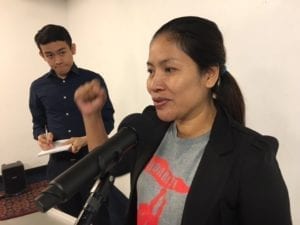
“We cannot wait for men to help us. We women have to do it”—Sophorn Yang, Cambodian garment worker organizer. Credit: Solidarity Center/Tula Connell
Sophorn Yang, a garment worker organizer in Cambodia, fired up the dozens of union activists and allies in the audience when she said,
“I’m happy to be here in room full of woman power!”
Yang discussed garment workers’ long struggle for decent wages, including a series of massive demonstrations in 2015 and 2016 in which several garment workers were killed by police and others beaten and arrested.
An estimated 700,000 workers in Cambodia sew and package more than $5 billion worth of clothing, textiles and shoes every year, nearly all on short-term contracts that make it easier to fire and control workers.
Yet even though nearly all garment workers are women, Yang said she is constantly challenged by male union leaders.
“In my country, the majority of leaders undermine my values because I am a woman,” Yang said, speaking through a translator. “They don’t know I have the will power to fight, especially in a sector where 90 percent of women workers are underrepresented, are under attack.
“We cannot wait for men to help us. We women have to do it.”
‘Organize, Build Coalitions, Work in Cooperation’
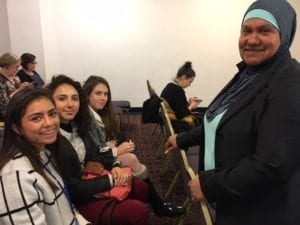
“There are more things we have in common than what divides us”—Sussie Lozada, UNITE Local 100 political director. Credit: Solidarity Center/Tula Connell
Two union activists from the United States emphasized the importance of organizing workers, joining with allies and reaching women in all job sectors and interests to build networks to strengthen women’s struggles on the job.
“We have the power to organize,” said Sussie Lozada, political director of UNITE Local 100. “Organize, build coalitions, work in cooperation—all are fundamental for us to grow and get what we want.
“There are more things we have in common than what divides us.”
Patricia Sauls, a domestic worker and leader of the Atlanta chapter of National Domestic Workers Alliance (NDWA), said joining a union empowered her to believe she could make positive change at work for herself and for other domestic workers.
“My union encouraged me to believe I do have a voice,” she said, telling participants that she was speaking publicly for the first time. “I am just so grateful for the sisterhood that is here to support me and stand by me.”
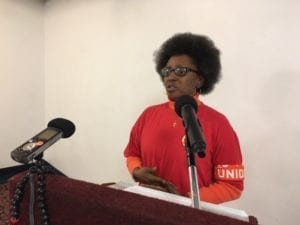
“My union encouraged me to believe I do have a voice”—Patricia Sauls, NDWA activist. Credit: Solidarity Center/Tula Connell
Sauls is part of a global delegation sponsored by the International Domestic Workers Federation (IDWF), which is mobilizing members around issues like preventing gender-based violence at work.
Joining the panel from different continents and diverse experiences, Sauls and Yang carried similar messages for their union sisters:
“We can win if we stay together and support each other,” said Sauls.
And as Yang said, “We need to come together to organize and fight, with passion, with real passion!”
Hundreds of high-level government delegates at the CSW for the first time are discussing women’s economic empowerment and the role of labor unions as core to achieving women’s rights—a huge milestone for working women around the globe in achieving recognition of their workplace struggles by the world’s human rights body—and one that worker rights organizations like the ITUC and Solidarity Center have long championed.
Follow us here, on Facebook and on Twitter @SolidarityCntr for coverage of our final event on Thursday, “Impact of Corporate Power to Women’s Economic Empowerment,” a panel sponsored by the Association for Women’s Rights in Development (AWID) and Solidarity Center.
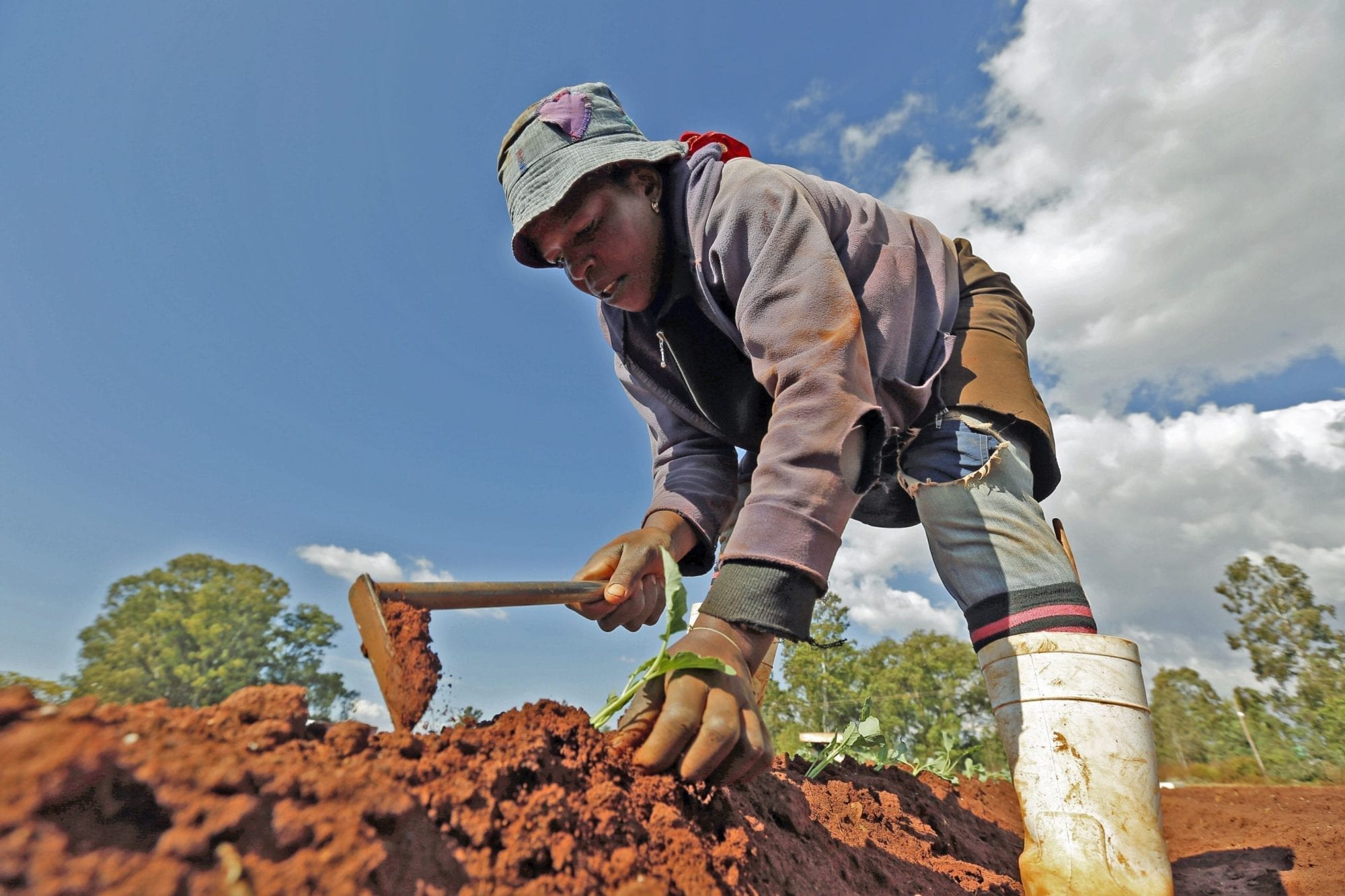
Mar 10, 2016
From domestic workers in New York City to garment workers in Bangladesh, women coming together to organize, demand fair treatment and address gender discrimination is critical to realizing women’s rights and economic justice. A new report from the AFL-CIO, the Rutgers Center for Women’s Global Leadership and the AFL-CIO Solidarity Center, Transforming Women’s Work: Policies for an Inclusive Economic Agenda, discusses the critical need to create an enabling environment for worker and community organizing, including inclusive macroeconomic and trade policies that promote decent work in the market and realign gender inequities in unpaid work in the home.
Economic policy is a critical tool that can promote or hinder gender equality and broadly shared growth. Traditional macroeconomic and trade policies have ignored or reinforced the structural barriers that impact women’s ability to compete fairly in the labor market, including the gender wage gap, occupational segregation and the disproportionate burden of unpaid work. While gender inequality is linked to reduced, less sustainable growth in the long term, the myopic focus on short-term growth—and the assumption that human rights will naturally follow—carries an inherent gender bias, as certain forms of gender inequality, particularly wage gaps between men and women driven by stereotypes of women workers as a cheap, expendable labor force, can temporarily create higher growth.
Read the full article at the AFL-CIO.










 the right to freedom of association,” said Bhattacharjee. “It is part of a global supply chain where the brands are the main drivers. Their purchasing practices are what causes the gender-based violence. Anything we do, they have to build held accountable in any agreement that works.”
the right to freedom of association,” said Bhattacharjee. “It is part of a global supply chain where the brands are the main drivers. Their purchasing practices are what causes the gender-based violence. Anything we do, they have to build held accountable in any agreement that works.”







